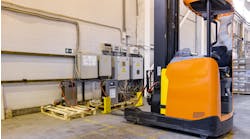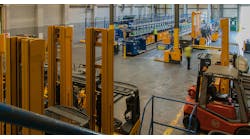Alanis Morissette got a big career boost by making irony pretty. Remember her song, Isn't It Ironic? "A no smoking sign on your cigarette break." ... "10,000 spoons when all you need is a knife."
Irony is defined as "a result that is the opposite of what was expected." How about "companies with engineers but their supply chains break." Ironic ... don't you think? Companies are looking to staff up on engineering talent but they can't get enough of the right kind.
A recent PricewaterhouseCoopers Manufacturing Barometer survey of industrial manufacturing executives found that 52 percent of respondents expect to add workers over the next 12 months, and the greatest interest is in production workers and technicians. Unfortunately, 25 percent of manufacturers forecast a lack of qualified workers as a hurdle for growth in the next 12 months.
If that's the case, then who's graduating from our engineering schools?
"We're seeing people with more generalist business skills, particularly in strategic planning, relationship planning and strategic sourcing," Tom Speh told me. Speh is in a position to see the irony in the nation's logistics manpower situation. He's a past president of the Council of Logistics Management (CLM) and chair of the member committee charged with exploring the association's focus. That focus has already sharpened with a name change. CLM will soon be the "Council of Supply Chain Management Professionals."
The name change was more for Wall Street's sake than CLM's.
"One of the barriers to supply chain management is this mentality of staying focused on quarterly results on Wall Street," Speh told me. "That sucks away R&D and any kind of expenditure on supply chain efficiency. Who will invest millions in new technology to make them more efficient in three years? No one. We have to get the attention of top corporate executives and of Wall Street."
Want another dose of irony? It comes out of Siemens AG. This German company has relied on the ingenuity of its German engineers for more than 150 years, contributing to Germany's status as the world's third largest industrialized economy. Guess where it's getting the engineers to design some of its newest cell phones. China.
And what about Siemens Dematic, the material handling arm of this great engineering giant? Will we start seeing material handling systems designed in China?
"Every system we design is unique," answers John Raab, vice president of business development for Siemens Dematic. "We're not making cell phones. There are no two identical material handling systems. The buildings are different and the use of the buildings is slightly different. The components of a material handling system could be engineered in China, Mexico or the Czech Republic, but the U.S. market will continue to need high quality material handling and supply chain engineers. Whether they come from other countries doesn't matter as much as that they're here."
Raab agrees with this magazine that material handling must be promoted as a discipline and be part of engineering curricula across this country. In fact, if we can't get enough home-grown talent to fill the need, industry must make material handling attractive for the best and brightest from other countries to come to the U.S. and not only study it here, but practice it here. The need is great and the cause is urgent. Our national security depends on it.
Think I'm overstating the case? If a disaster strikes and our food sources are contaminated, how will we manage tracking and tracing? How will we link the disparate data streams with their corresponding product streams? We'll need to "connect the dots" if we're going to fight this country's enemies more effectively.
Who's connecting the dots in your supply chain? It had better be you. If it's not, the irony won't be pretty.


